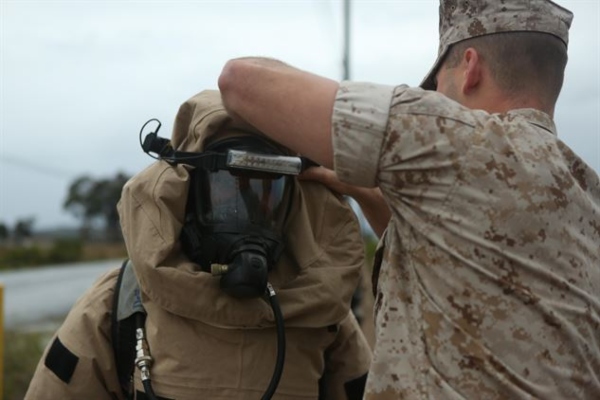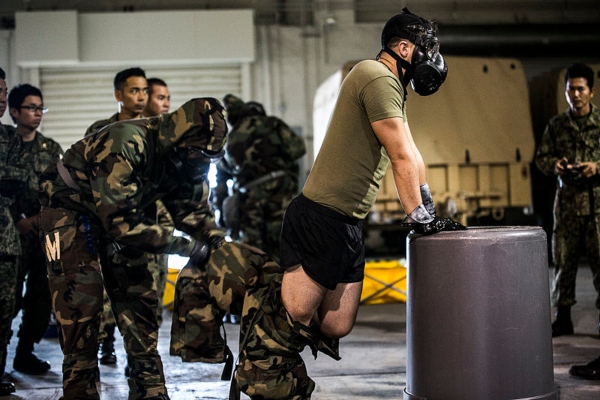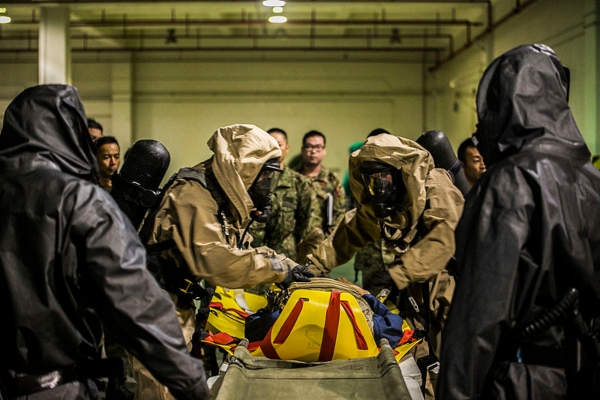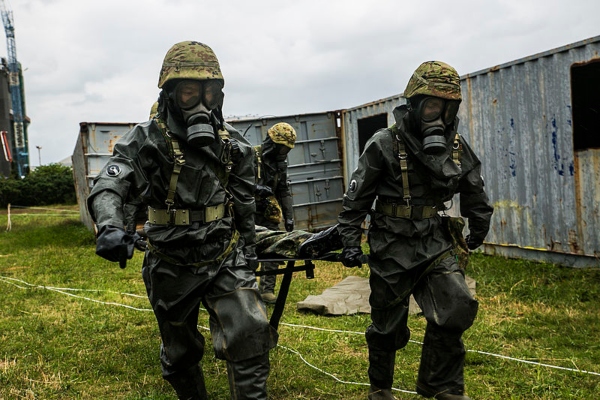Marine Corps CBRN Specialists (MOS 5711) are equipped to handle chemical, biological, radiological, and nuclear (CBRN) threats.
The primary objective of a CBRN Specialist is to prepare and train others in the Marine Corps about the dangers of chemical warfare.
Marine Corps CBRN Specialists take protective measures as well as handle CBRN threats as they arrive.
Learn what it takes to become an Marine Corps CBRN Specialist (MOS 5711) by reading the full article.
Related Article – Marine Corps Cyber Network Operator (MOS 0651): 2019 Career Details
Education, Qualifications, and Training

Marine Corps CBRN Specialists (MOS 5711) deal with very serious and dangerous chemical and biological weapons.
Therefore, the job duties of an CBRN Specialist are not only extremely important but also requires a fair amount of training and education.
In order to qualify for this Marine Corps MOS you must meet certain standards.
Here is what you need to complete in order to qualify for MOS 5711:
Education
The Marine Corps requires new recruits to have a high school diploma or GED equivalent.
Higher learning opportunities like college credits or a degree are helpful, yet not mandatory to join the U.S. Marines.
Those that are interested in joining the U.S. Armed Forces must complete the Armed Services Vocational Aptitude Battery (ASVAB).
The series of tests determines which Military Occupational Specialties (MOS) a soldier qualifies for based on performance.
An Marine Corps CBRN Specialist (MOS 5711) is required to have a General Technical (GT): 110 score or higher on the ASVAB in order to qualify.
Qualifications
Marines must be citizens of the United States as well as at least 18 years of age.
Secondly, normal color vision (no color blindness) is required for MOS 5711.
The Marine Corps also does a medical examination to guarantee there are no respiratory problems that prohibit a masked individual from accomplishing the job duties of MOS 5711.
Marine Corps CBRN Specialists (MOS 5711) must not have any hypersensitivity to the wearing of protective clothing for the job, or receiving preventive immunizations.
Finally, CBRN Specialists are required to receive secret security clearance from the Department of Defense.
The security clearance requires a detailed background investigation.
The Department of Defense will examine criminal history and personal finances.
Additionally, a history of alcohol or drug abuse could disqualify you from MOS 5711.
Training
Marines begin their journey in the military branch at basic combat training, or boot camp.
Boot camp is demanding in the Marine Corps and lasts 13 weeks.
After finishing basic combat training soldiers are transferred to specialized training for their Military Occupational Specialty (MOS).
Marine Corps CBRN Specialists (MOS 5711) need to complete the Basic CBRN Defense Enlisted Course.
The training takes place at the U.S. Marine Corps NBC School in Missouri (Ft. Leonard Wood).
CBRN Specialists will learn basic skills related to chemical and biological warfare, including hazard prediction, contamination avoidance, and decontamination practices.
What does an Marine Corps CBRN Specialist Do?

An Marine Corps CBRN Specialist (MOS 5711) is primarily responsible for the survival and operation in a chemical, biological, radiological, or nuclear environment.
CBRN Specialists have the capabilities to train their unit as well as take measures to remove the threat of chemical or biological warfare.
While most of the time spent as a Specialist involves training of other soldiers in CBRN defense training tactics, there is potential to have to perform operations in the field, and during combat.
Marine Corps CBRN Specialists operate within the combat operations center of the unit.
Soldiers assist the unit and CBRN defense officers in order to advise commanders on conditions in the field.
The objective is to help support a successful completion of a mission by providing suitable CBRN defense.
During combat MOS 5711 soldiers may provide tactical information to a commander such as radiation exposure status or designating contaminated areas within a battlefield.
Lastly, Marine Corps CBRN Specialists must maintain and service all CBRN defense equipment and supplies related to the MOS.
Related Article: List Of Marine Corps Bases In The US
Job Duties of MOS 5711
According to the Marine Corps, the official job duties of a CBRN Specialist (MOS 5711) include:
- Assist, conduct, and supervise training in CBRN defense monitoring, surveying, and reconnaissance.
- Provide chemical detection and identification to the rest of the unit.
- Gather biological agent collection and sampling.
- Decontaminate military personnel, equipment, and casualties.
- Execute protective measures and first aid to unit personnel.
Commanders depend on CBRN Specialists (MOS 5711) to provide “recommended courses of action during combat in order to meet operational objectives and facilitate mission accomplishment which relates to CBRN defense”.
CBRN Defense
The use of chemical, biological, radiological, or nuclear weapons (CBRN) is a violation of international law.
The law has been enforced since the international community came together after World War I and set forth new standards of combat ethics.
Supporting countries signed a non-proliferation treaty related to nuclear weapons in order to prevent the spread and use of them.
However, not every country in the world observes the non-proliferation treaty to prevent the development, stockpiling, and transfer of CBRN weapons.
While the threat is considered relatively low there is a possibility of exposure to chemical, biological, radiological, or nuclear weapons in non-supporting countries.
Therefore MOS 5711 CBRN Specialist was created by the Marine Corps in order to remain vigilant about the threat of nuclear and other biological or chemical weapons.
What does an Marine Corps CBRN Specialist make?

Marine Corps CBRN Specialists (MOS 5711) are not paid based on Military Occupational Specialty.
The Marine Corps pays soldiers based on military rank and years of service.
| Insignia | Pay Grade | Rank | Abbreviation | 2023 Minimum Monthly Pay |
|---|---|---|---|---|
| E-1 +4 months | Private | Pvt | $1,917.60 | |
| E-2 | Private First Class | PFC | $2,149.20 | |
| E-3 | Lance Corporal | LCpl | $2,259.90 | |
| E-4 | Corporal | Cpl | $2,503.50 | |
| E-5 | Sergeant | Sgt | $2,730.30 | |
| E-6 | Staff Sergeant | SSgt | $2,980.50 | |
| E-7 | Gunnery Sergeant | GySgt | $3,3445.80 | |
| E-8 | Master Sergeant | MSgt | $4,957.20 | |
| E-8 | First Sergeant | 1stSgt | $4,957.20 | |
| E-9 | Master Gunnery Sergeant | MGySgt | $6,055.50 | |
| E-9 | Sergeant Major | SgtMaj | $6,055.50 | |
| E-9 | Sergeant Major Of The Marine Corps | SgtMaj | $6,055.50 |
Benefits
The U.S. Marine Corps offers many benefits in addition to a monthly paycheck:
- Medical Insurance
- Vacation Time
- Special Pay
- Retirement
- Affordable Life Insurance
- Housing: Allowances for living expenses, utilities, and maintenance.
- Food: Allowance for the on-base dining hall and access to tax-free department and grocery stores.
- Education: Marines can earn full-tuition, merit-based scholarships, allowances for books and fees, plus annual stipend for living expenses.
Job Reviews
It is not easy to find job reviews specific to a Marine Corps CBRN Specialist (MOS 5711).

However, job sites like Indeed.com have a long list of reviews related to serving the Marine Corps.

If you are interested in obtaining more information about serving the Marine Corps and working MOS 5711, contact a local recruiter.

Related Article – Marine Corps Imagery Analysis Specialist (MOS 0241): 2019 Career Details
Civilian Job Opportunities
Unfortunately, there is not a direct civilian job equivalent of MOS 5711 Marine Corps CBRN Specialist.
However, the skills you attain serving the Marine Corps can lead to a variety of careers after the military.
Employers value veterans because of the unparalleled skills, experience, discipline, and leadership they acquire serving the military.
Some former MOS 5711 get jobs as first responders or positions in law enforcement.
Summary
An Marine Corps CBRN Specialist (MOS 5711) helps keep a unit safe by inspecting and using preventive measures against chemical and biological warfare.
Chemical, biological, radiological, and nuclear weapons (CBRN) are a continual threat around the globe despite policies to end the development and stockpile of them.
Resources:
- 5 Best Jobs for Female Marines - June 20, 2024
- 10 Best Marine Corps Recruiting Videos of All Time - June 20, 2024
- Marine Corps Requirements - June 20, 2024




